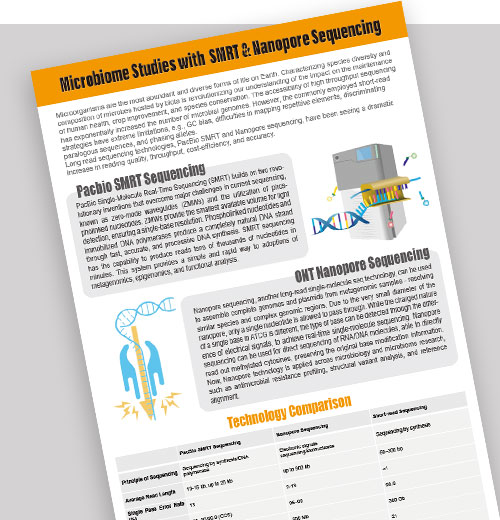We use cookies to understand how you use our site and to improve the overall user experience. This includes personalizing content and advertising. Read our Privacy Policy


We are dedicated to providing outstanding customer service and being reachable at all times.
Bacterial Whole-Genome Resequencing
Bacterial whole-genome resequencing involves sequencing the entire genome of a bacterium and comparing the sequencing reads to a known reference. CD Genomics is a leading custom service provider in sequencing technologies, particularly in the field of long-read sequencing. Our bacterial whole-genome resequencing service enables the analysis of multiple genomic variation types among microbial strains, providing accurate and in-depth information on bacterial genome sequences. With world-leading equipment combined with cutting-edge sequencing technology, we continue to help researchers gain new insights into bacteriology.
Bacterial Whole-Genome Resequencing

Whole-genome resequencing is a powerful tool to study bacterial genomes. So far, this method has helped researchers detect mutations in genetic suppressor screens, infer genome replication status, and identify base-pair substitutions, short insertions/deletions, and structural variants in genome instability studies. To perform whole-genome resequencing, Illumina sequencing has become the most straightforward and widely used approach. As the study of bacterial genetics continues, the shortcomings of this technology have become increasingly apparent. The Illumina platform has read lengths between 50-300 bp, which makes it very difficult to perform de novo assembly of the genome through repetitive genomic regions. The long-read sequencing platform overcomes the challenges related to short Illumina reads by significantly increasing read length. In addition, the ability of long-read sequencing to directly detect DNA base modifications without prior knowledge of their existence makes it an excellent tool to promote our understanding of a wide range of topics in bacteriology.
Our Service Support
- Detection and identification of genetic mutations, such as key deletions and insertions as well as low-frequency mutations among microbial strains.
- Bacterial genomic complexity research, such as the investigation of homologous genes between different types of strains.
- Investigation of strains' adaptability to different niches.
Workflow of Our Bacterial Whole-Genome Resequencing

Sample Requirements
- Sample Type: Genomic DNA, OD260/280=1.8~2.0, no degradation and no contamination
- Bacterial DNA amount:
Illumina HiSeq platform ≥ 2 μg,
PacBio Sequel ll platform ≥ 5 μg, depending on the desired library insertion size.
Nanopore PromethION platform: ≥ 5 μg.
Data Analysis Contents
| Standard Analysis | Advanced Analysis |
| The removal of the sequencing adapters and low-quality sequences | Comparative genome analysis |
| Data QC | Gene synteny analysis |
| Reference genome alignment | Phylogenetic analysis |
| Genetic variation detection, annotation, and statistics, including SNP/InDel, CNV, SV | Customized analysis |
Benefits of Our Service
- Decades of experience in genomics services.
- Optimized and well-established long-read sequencing platforms.
- Keeping up with the frontier of scientific research.
- Fast turnaround time and complete analytical study reports.
Whole-genome resequencing has multiple applications in bacteriology. Our services provide rapid and accurate bacterial genome sequence information to guide and inform screening for superior traits and strain resistance studies. Our customer service representatives are available 24 hours a day from Monday to Sunday. Let's know what your goals are and our team of experts will contact you within one business day to discuss your needs.
Case 1: T2T Assemblies of 142 S. cerevisiae Strains
Background
Unlocking the intricate tapestry of genetic diversity within a species is pivotal for unraveling its evolutionary journey. Pangenomes, serving as a comprehensive genetic atlas, offer profound insights into both sequence polymorphisms and structural variants (SVs) present in a species.
Challenges
Navigating the genetic labyrinth of Saccharomyces cerevisiae posed formidable challenges. The species' broad spectrum of phylogenetic and ecological diversity necessitated an innovative approach to comprehensively capture its genomic essence. Overcoming complexities inherent in heterozygous diploid and polyploid isolates was essential for unearthing the true tapestry of genetic variation.
Methods
Drawing inspiration from the Yeast 1011 Genome Project, they meticulously selected a cohort of 100 Saccharomyces cerevisiae strains for hifi sequencing, yielding a treasure trove of 100 high-quality reference genomes. An additional 18 genomes were meticulously reassembled using ONT raw data, complemented by 24 publicly accessible reference genomes. This intricate amalgamation culminated in the creation of the Saccharomyces cerevisiae Reference Assembly Panel (ScRAP), a peerless reference atlas.
Results
The ScRAP stands as a testament to the power of pangenomics in unraveling the species' genomic tapestry. Within its confines, they unearthed approximately 4,800 nonredundant SVs, each a unique brushstroke on the canvas of genetic diversity. Notable among these findings were the dynamic fluctuations in telomere length and transposable elements, unveiling previously concealed layers of genomic dynamics. Complex aneuploidies, characterized by sweeping chromosome deletions and translocations, emerged as recurrent phenomena, further enriching our understanding of genetic variation.
References
- Burby, P. E., et al. (2017). "Implementation and data analysis of Tn-seq, whole-genome resequencing, and single-molecule real-time sequencing for bacterial genetics." Journal of bacteriology, 199(1), e00560-16.
- Tenea, G. N. (2022). "Decoding the Gene Variants of Two Native Probiotic Lactiplantibacillus plantarum Strains through Whole-Genome Resequencing: Insights into Bacterial Adaptability to Stressors and Antimicrobial Strength." Genes, 13(3), 443.
- O'Donnell, Samuel, et al. "Telomere-to-telomere assemblies of 142 strains characterize the genome structural landscape in Saccharomyces cerevisiae." Nature Genetics (2023): 1-10.
For research purposes only, not intended for personal diagnosis, clinical testing, or health assessment
